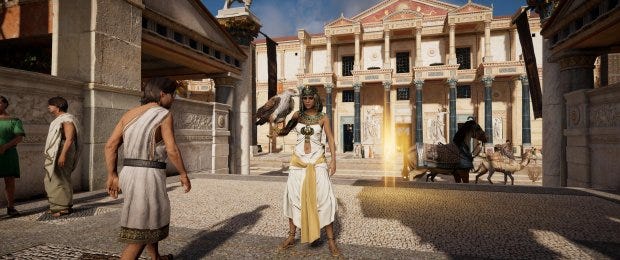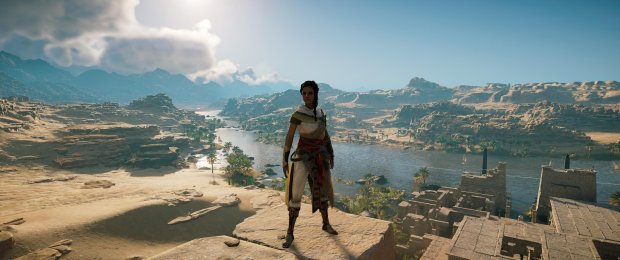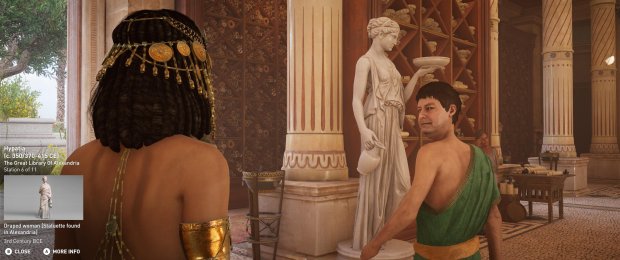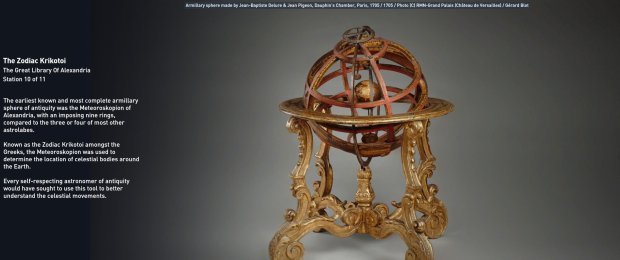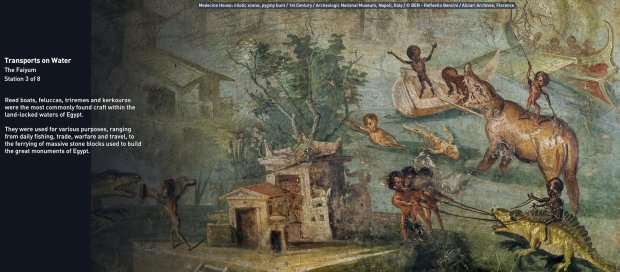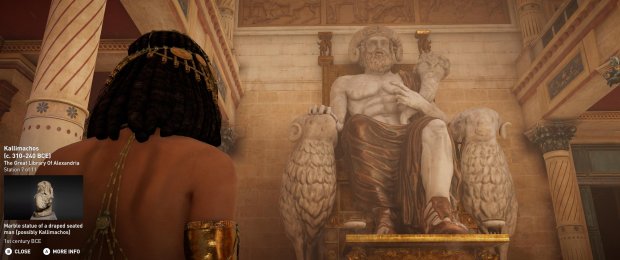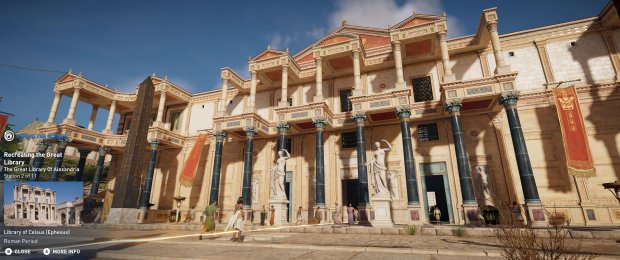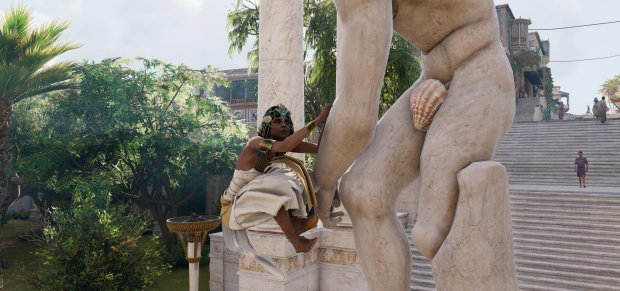We perhaps need a little bit more education: Assassin's Creed Origins' Discovery Tour
Pharaoh nuff
The announcement of the Discovery Tour was a source of much rejoicing. Ubisoft's Assassin's Creed games have for many years built these extraordinarily detailed cities, that are swiftly disposed of as the series' annual development cycle demands fresh urban grist for the mill. The recreation of Ptolemaic Egypt was by far Ubisoft's most remarkable, and the idea of using it as an educational tool, a living museum of sorts, was well received.
In practice, Discovery Tour by Assassin’s Creed: Ancient Egypt (to give it its given name) is a peculiar thing, made with much ambition, but seemingly little understanding of how education actually works.
As I'd struggled with Ubisoft's servers to let me load the game in the first place, while they repeatedly refused me access to the product I'd downloaded from Steam because their own internet wasn't working, I thought to myself, "I hope the voiceover is pleasingly academic, a sort of NPR-y voice that's at once relaxing and authoritative." This only made it more jarring when I was greeted by a voice more suited to booming, "In movie theatres, Friday!" For the introduction, I figured, sure, this is fine. But he persists, his daft tones narrating the first and about half of the game's tours, making it incredibly hard to concentrate on the dry and dull morsels of information about Alexander's planning of the site for Alexandria.
The tour itself rapidly unravels. The third piece of information you're given talks about how Alexander's architects were forced to use flour to mark out the foundations, because they didn't have access to chalk. And then, wouldn't you know it, birds got involved.
"Clouds of migrating birds swept down and ate the flour, erasing the plans. This prompted Alexander to seek guidance from the oracles, who reassured him that his future city was destined to feed a large population."
So my first thought here was, "How do you know?" Which means my second thought was, "Where are the links to referencing text?" And there aren't any. We're just asked to take this rather twee fairy tale as fact, because the gravelly voiced man said it. Which in turn meant my third thought was, "So Ubisoft believes in oracles?"
To do this properly, you can't just be reporting myths as facts! You say, "According to myth..." It's pretty basic stuff.
(For any who care, the answers are here, but we found that on our own, not via the game, and in no way should it have just been repeated as factual.)
Clicking A for "MORE INFO" is suggested for each stop of each of the 75 tours, so I thought that's where I might find the references, further reading and links to relevant materials. But pressing it provides you with precisely the same information, not a single extra detail, this time written instead of spoken. It was easier to concentrate on that same information here, certainly, but only until I got bemused trying to find where the "MORE INFO" was, before realising there wasn't any. There never is.
I suppose reactions to this aspect will be down to one's expectations going in. I had been hoping for what had been promised - a delivery of the information gathered from academics, learned over the four years of making the game. Like they said it would be. What I've got is something akin to a haphazard audio tour to distract tourists from how much they spent on the entry fee. Of course, if someone were expecting some afternoon filler on the History Channel, then this would be far more in line with that. Narrator voice included.
And the more I persist, the less I can fathom who this is actually for. Alongside Mr Trailers is Mrs Pharmaceutical Commercial (uncannily similar to the glorious spoofs from Better Off Ted), both intoning a confusing mix of information that doesn't seem like it could be useful to anyone. For instance, to whom is the following helpful?
"The earliest known and most complete armillary sphere of antiquity was the Meteoroskopion of Alexandria, with an imposing nine rings, compared to the three or four of most other astrolabes.
Known as the Zodiac Krikotoi amongst the Greeks, the Meteoroskopion was used to determine the location of celestial bodies around the Earth.
Every self-respecting astronomer of antiquity would have sought to use this tool to better understand the celestial movements."
This is so very typical of the type of information given by Discovery Tour. Needlessly over-complex language that fails to explain its terms, yet is somehow at the same time devoid of anything useful for people who already understood them.
If this is intended to be used in schools, teachers would need a discovery primer for the Discovery Tour and would be translating on the fly. What's an "armillary sphere"? What's an "astrolabe"? If you're trying to teach, using such obscure terms in the opening line is guaranteed to fail. Heck, if you're aiming at younger students, then even terms like "celestial movements" are needlessly complicated. A phrase like "the movement of the stars and planets" would have far more sensibly communicated the meaning.
It's pretty ubiquitous, these little snippets announcing facts, but not explaining them. To pick one at random:
"Reed boats, feluccas, triremes and kerkouros were the most commonly found craft within the land-locked waters of Egypt."
Er, great. And those are? They look like? The differences between them are? If this were handed in as homework, a teacher would be scrawling all over it, "You've copied these facts off the internet, but don't appear to understand them!"
The more I play, the more regions I visit and the more tours I follow, the more I think I understand what's really happening here. Perhaps this is an exercise in frustration from a development team who worked extraordinarily hard to provide one of gaming's most extraordinarily detailed places, that was then used as the backdrop for a very silly game. As I wander through the Library Of Alexandria, or the Islands of Pharos, or the backwaters of Haueris Nome, what I sense from the nature of the tours is a desperation for people to know just how bloody hard the team worked to build this, and how incredibly accurate the depictions are.
See that Library?! There are no descriptions of it anywhere! We had to make one up, and to do that, we used images of a contemporary library in Ephesus! We went to so much trouble to create something authentic and did so much research, and all you did was see if you could get a horse to climb a statue. You bastards.
See that statue? The one you just ran past and didn't give a second glance, because you were trying to stab some made up man to death? That was Hypatia! And she was bloody brilliant! She was one of the greatest scientists of the day, and we made that statue based on the worn remains that still exist today, but meticulously restored it and put it in the Library exactly where we believe it would have stood! AND YOU DIDN'T EVEN LOOK AT IT!
I suspect much of my negative reaction is due to the version of this I'd imagined on its announcement last year, and the enormous distance between that and what has been made. I'd imagined recorded interviews with the experts, or at least the experts themselves enthusing on topics. I'd hoped for developers explaining how they'd made decisions, talking about their research. I'd also imagined something that could be useful in schools, to provide a really splendid way to improve history lessons. Instead I've got super-slick narrators saying sentences like,
"How do you calculate the circumference of the Earth? With a camel, two sticks, and shadows cast by the sun."
and then literally no further explanation of what that means. Good gravy.
For those who were approaching this with the idea that it might be rather splendid to just have complete access to the whole of the game, with the combat switched off, just letting you explore the cities and surrounding deserts, then yes, it does that. But, well, the original game pretty much let you do that too. Sure, you had to sneak around inside some areas, but the world was already pretty open, and with the game surrounding it, a lot more interesting to explore. Here, with combat switched off (although you can still bash into upset NPCs, and charge horses toward children to your heart's content), you can climb, swim, take photos while standing on statues and so on, and go absolutely anywhere you want. But for me, doing so really reveals just how detached from the world you really are.
You can't interact with anything, other than the tour. It's like you're a ghost, unable to be seen or heard by the world you're in. Well, a poltergeist, since you can shove into everyone. Admittedly the only way you touched the game proper was to punch and stab it, but it's revealing how separating it is to remove that veneer of contact. And yet it does work. You absolutely can scramble over the whole game within limitations, and poke around in the vividly precisely recreated cities. Although, once again I'd argue, the only way to really appreciate this properly is to have those passive-aggressive audio tours point it out to you.
And I'm not being entirely fair. In between the very, very many poor explanations and narrations, there are some occasional good ones. A tour of the Faiyum, taken both on foot and by boat, gives a perfectly decent surface explanation of the Faiyum pyramid, the reasons it was separate from the bulk of other pyramids, and the reason for the situating of the wonderfully named metropolis, Krokodilopolis. And I've certainly not minded being able to fast travel to the pyramids to poke around them. This is by no means a disaster at all.
It's just that I'd argue it fails at its primary intent: to teach. It just blurts detached, unexplained facts in glossy voices.
There are some other silly issues. The two narrators constantly interject with the same three nonsensical "jokes". At any point while you're exploring you might hear a, "My kingdom for a glass of water!" - the shortest of its uninterruptible gags. "Don't mind me!" Mr Trailers wackily interrupts, "It's not like Ancient Egypt is going anywhere!!!" Or the tour might think it's useful to tell you that you can use a mount to travel faster along long distances, for the nineteenth time, after you've just gotten off a horse. Or are halfway up a pyramid, as happened to me one time. Then there's the movable camera during the narration when you're fixed to the spot, which for no sensible reason insists on returning to the same view if you leave it for literally a second. Silly, niggly things that don't make a lick of sense in the context of the Tour mode.
I don't know. Honestly, I think Ubisoft deserves this peculiar little vanity project, a mode of the game that's most useful function is to pointedly yell at you just how much work went into the backgrounds you ran past last year. But beyond this, and the novelty of ghosting around its busy world, it doesn't really have much purpose. As an educational tool (which we can only assume it's intended to be, what with the bizarre censoring of naked bits), I'd venture it's a colossal dud, but godspeed to any kids lucky enough to be allowed to muck around in it during school - it's not likely to teach them anything useful, but it'll be better than writing down banal notes about the Spinning Jenny or whatever the hell history lessons were supposed to have been about.
I love that it exists. I don't begrudge it for any of its ridiculous failings, really. It'd have been amazing if it could have been this gently entertaining and interesting exploration of Egyptian history, perhaps something like an in-situ podcast. But it isn't. It's a museum audio tour, along with all their obvious shortcomings, that takes no advantages of its medium, ignoring all the vast possibilities of linking out to relevant Wikipedia articles and papers, or offering any possibility of directing players to further reading.
Discovery Tour by Assassin’s Creed: Ancient Egypt is out now on Windows, for £16/$20/20€, via Steam and Uplay.
